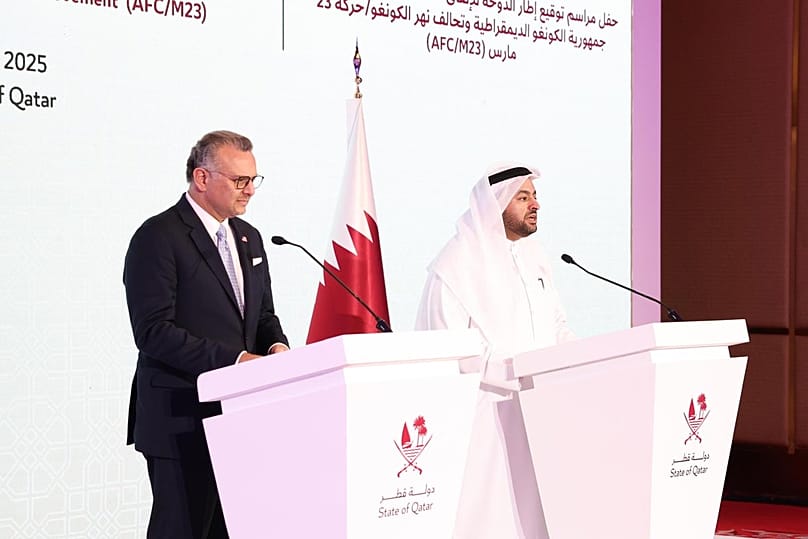Delegations from both sides said the document creates eight protocols that will be negotiated individually in the coming weeks.
The Democratic Republic of the Congo and the M23 armed group signed a framework agreement in Doha on Saturday, setting out a structure for negotiations aimed at ending fighting in the country’s troubled east.
The Doha framework comes after months of intense fighting in the North and South Kivu provinces, which escalated early this year with the M23 group capturing the regional capital, Goma, and seizing swathes of mineral-rich territory.
Delegations from both sides said the document creates eight protocols that will be negotiated individually in the coming weeks. According to M23’s head negotiator Benjamin Mbonimpa, the protocols address the root causes of the conflict and must each be completed before a final peace deal can be signed.
Qatar, which has hosted several rounds of talks since April, said the framework marks a step towards stabilising eastern Congo but stressed that the process now moves into a more detailed phase.
According to a senior Qatari official involved in the mediation, the agreement opens the door to further negotiations on issues including restoring state authority, governance reforms and the return of displaced civilians.
The official added that the framework itself “is not the end of the road” and that both sides will be responsible for implementing its provisions as talks continue.
The document does not change the conditions on the ground for now; however, Mbonimpa said progress will depend on the sequential completion of each protocol.
Joint management of disputed areas on the table
M23 spokesperson Lawrence Kanyuka said one of the central topics for negotiation is the joint management of areas currently held by the rebels, an idea the two sides have discussed previously but not finalised.
M23, which operates in eastern Congo with backing from neighbouring Rwanda, is one of more than 100 armed groups active in the region. Fighting has displaced about seven million people, and the United Nations continues to describe the humanitarian situation as among the most severe worldwide.
The security landscape deteriorated sharply earlier this year when M23 captured Goma and Bukavu, two major urban centres in North and South Kivu. Those advances strengthened the group’s negotiating position while increasing pressure on regional and international mediators.
In July, Kinshasa and M23 endorsed a declaration of principles committing to a comprehensive peace agreement. The document called for restoring state authority in cities under rebel control and for exchanging prisoners.
But both sides missed their August deadline to finalise the full agreement. And in October, they created an oversight body meant to prepare for a possible permanent ceasefire, but disagreements over implementation continued.
US hails Doha peace talks framework
Senior US adviser Massad Boulos, who attended the signing in Doha, said the framework launches a longer process and gives both sides “an opportunity to move towards a lasting settlement”, while acknowledging that substantive negotiations remain ahead.
Despite the seeming headway for peace, regional tensions between Congo and Rwanda continue to overshadow the talks.
Kigali, accused of fueling the conflict, denies supporting M23, while Kinshasa maintains that Rwanda backs the rebels. Washington has stepped up mediation between the two countries, leading earlier this year to a separate bilateral agreement.
The new framework outlines a path towards de-escalation, but its impact will depend on whether both sides follow through on the next phase of negotiations and whether fighting subsides in areas where civilians continue to flee. The conflict has killed thousands and displaced hundreds of thousands, creating one of the world's worst humanitarian crises. By Mohamed Elashi, Euronews





